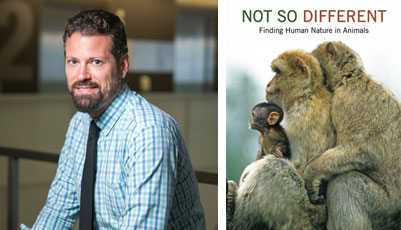
With the debate between science and creationism continuing to simmer in many corners of society, John Jay Professor Nathan H. Lents has weighed in with his latest book, Not So Different: Finding “Human Nature” in Animals (Columbia University Press, 2016), in which he posits that human behavior and animal behavior are not as different as once believed.
Lents, a Professor of Molecular Biology and interim Director of the Honors Program and the Macaulay Honors College at John Jay, said in a recent interview that the journey that led to the book started about 6 years ago. “The thing that fascinates me is human behavior,” he said. “Why do we behave the way we do? It turns out we’re not so different from other species. It may look different, but that’s because of culture, which other species don’t have much of. It tends to create a complex smoke screen.”
The connection between evolution and Lents’s primary scholarly focus on molecular biology is not as much of a leap as it might appear. “I’m a biologist at heart, so I look at every single thing as a product of evolution,” he said. “I’m always thinking of evolution.” The book’s “never stated but always present thesis,” said Lents, is that evolution “has shaped our behavior as much as it has our anatomy.”
Not So Different has been touted by one reviewer as “an easy read absent a lot of disciplinary jargon,” and Lents says that distinction was intentional. “I purposely aimed it at a general audience of non-specialists,” he explained. “One goal was to expose readers to some of the great progress in understanding animal behavior that’s been made over the last few decades.”
In the book, based on extensive and rigorous research in psychology, evolutionary biology, cognitive science, anthropology, and ethology, Lents points out that animals fall in love, barter goods and services, grieve for their dead, deploy sex as a weapon, and communicate with one another using rich vocabularies, among other typically human behaviors.
As for the ongoing science vs. creationism debate, Lents says forthrightly, “That’s a big part of why I did this book.” He asserts that there is an attempt at middle ground between evolution and creationism, whose adherents “accept evolution, but nonetheless posit that certain things about humans are the product of something supernatural, or intelligent design.” It is this that his book pushes back against.
Lents, who admits to a restless intellectual curiosity in his research, writing and blogging, has another book manuscript in development — Not So Perfect: Big Design Flaws in the Human Form, which he hopes to see published in 2017 or 2018. The book, he says, “will be impossible to read as anything other than an attack on intelligent design. It will also be for a general audience, but written so that scientists would also be delighted by it.”
One key difference between Not So Different and Not So Perfect, he said, is that “animal and human behavior has been written about many times before, but no one has written a whole book on flawed design in humans.”
Lents has toured extensively in the past several months to promote his new book, and he has a book talk scheduled at the College on Nov. 15 at 4:30. “Given John Jay’s unique place in this,” he said, “I decided to focus specifically on justice, so the talk will be on “The Biological Foundations of Justice.”
Lents created, administers and writes “The Human Evolution Blog,” which can be viewed at www.TheHumanEvolutionBlog.com.
The Chronicle of Higher Education
10/2/16
Animal Minds: The new anthropomorphism



